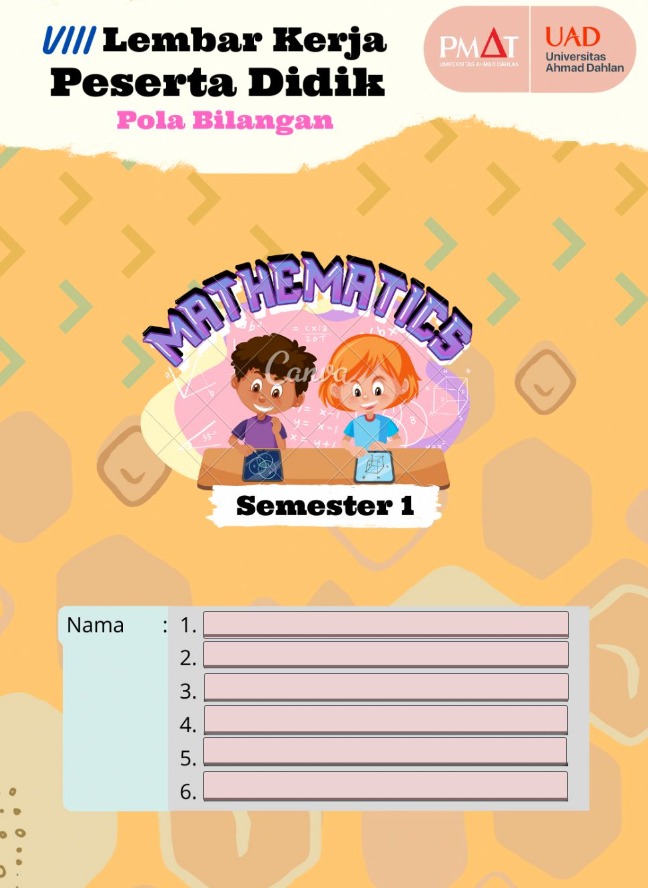Developing problem-based learning electronic student worksheet for number pattern topic
DOI:
https://doi.org/10.12928/bamme.v2i2.6813Keywords:
Liveworksheet, Number pattern, Problem-based learning, Students’ e-worksheetAbstract
The background of this research is the lack of technology-based learning materials, teachers, and students' need for the variety of new learning materials in SMP Negeri 1 Bantarkawung. This study aimed (1) to produce problem-based learning electronic student worksheets for number patterns and (2) to know the usefulness of problem-based learning electronic student worksheet for number patterns in terms of validity and practicality. It was the R&D (Research and Development) using ADDIE (Analyze, Design, Development, Implementation, and Evaluation) model. This research was conducted in class VIII A SMP Negeri 1 Bantarkawung involving six students in a small class trial and twenty-eight students in a big class trial. The research instruments were interview guidelines and questionnaires to material experts, media experts, and students' responses. The results showed that students' electronic worksheets were valid and practical. The evaluation by students' electronic worksheet material expert got 70,50, categorized as very valid. The review from media experts showed that Students' Electronic Worksheet got 68,50, which was classified as very valid. Meanwhile, the small class trial got 62,84, categorized as practical. Moreover, the big class trial got 65,39, and was classified as practical.
References
Amalia, A. D., & Lestyanto, L. M. (2021). LKS berbasis saintifik berbantuan Live Worksheets untuk memahamkan konsep Matematis pada Aritmetika Sosial. Jurnal Cendekia: Jurnal Pendidikan Matematika, 5(3), 2911-2933.
Amir, M. F., & Wardana, M. K. D. (2018). Pengembangan Perangkat Pembelajaran Berbasis Masalah Kontekstual untuk Meningkatkan Kemampuan Metakognisi Siswa Sekolah Dasar. Journal of Medives, 2(1), 117-128
Amthari, W., Muhammad, D., & Anggereini, E. (2021). Pengembangan E-LKPD Berbasis Saintifik Materi Sistem Pernapasan pada Manusia Kelas XI SMA:(Development of E-LKPD Based on Scientific in Human Respiratory System for Senior High School Students Grade XI). BIODIK, 7(3), 28-35.
Astuti, A. P., Aziz, A., Sumarti, S. S., & Bharati, D. A. L. (2019, June). Preparing 21st century teachers: implementation of 4C character’s pre-service teacher through teaching practice. In Journal of Physics: Conference Series (Vol. 1233, No. 1, p. 012109). IOP Publishing.
Fikri, Z. (2018). Pengembangan LKS Berbasis Etnomatematika Dengan Pendekatan Scientific Untuk Meningkatkan Hasil Belajar Matematika Siswa Sekolah Menengah Pertama. Jurnal Pendidikan Matematika dan Ilmu Pengetahuan Alam (Al-Khwarizmi), 8(2), 173-182.
Fitriyah, I. M. N., & Ghofur, M. A. (2021). Pengembangan E-LKPD Berbasis Android Dengan Model Pembelajaran Problem Based Learning (PBL) Untuk Meningkatkan Berpikir Kritis Peserta Didik. Edukatif: Jurnal Ilmu Pendidikan, 3(5), 1961-1970.
Futihat, S., Wibowo, E. W., & Mastoah, I. (2020). Pengembangan media puzzle huruf untuk meningkatkan kemampuan siswa dalam membaca permulaan. Ibtida’i: Jurnal Kependidikan Dasar, 7(02), 135-148.
Jamilah, J. (2020). Guru profesional di era new normal: Review peluang dan tantangan dalam pembelajaran daring. Premiere Educandum: Jurnal Pendidikan Dasar Dan Pembelajaran, 10(2), 238-247.
Jenanda, B. (2021). Pengembangan e-LKPD berbasis pendekatan pendidikan matematika realistik indonesia (PMRI) materi kekongruenan dan kesebangunan kelas IX.2 SMP N 1 Kec. Situjuah Limo Nagari.
Komariah, K., Sofyan, H., & Wagiran, W. (2019). Problem-based learning: the implementation and the urgency for improving learning quality. Jurnal Kependidikan: Penelitian Inovasi Pembelajaran, 3(2), 207-219.
Kustandi, C., & Darmawan, D. (2020). Pengembangan Media Pembelajaran: Konsep & Aplikasi Pengembangan Media Pembelajaran bagi Pendidik di Sekolah dan Masyrakat. Prenada media.
Nafiah, Y. N., & Suyanto, W. (2014). Penerapan model problem-based learning untuk meningkatkan keterampilan berpikir kritis dan hasil belajar siswa. Jurnal Pendidikan Vokasi, 4(1).
Oktavia, E. A. (2017). Pengembangan Lembar Kerja Siswa (LKS) Matematika SMP Berbasis Etnomatematika (Doctoral dissertation, Pendidikan Matematika-FKIP).
Prastika, Y. (2021). Pengembangan E-LKPD Segi Banyak Beraturan dan Tidak Beraturan Berbasis Liveworksheets Terhadap Hasil Belajar Peserta Didik Kelas IV Sekolah Dasar (Doctoral dissertation, Universitas Negeri Padang).
Prastowo, A. (2011). Panduan kreatif membuat bahan ajar inovatif. Yogyakarta: DIVA Press.
Purwanto. (2010). Instrumen penelitian sosial dan pendidikan. Yogyakarta: Pustaka Pelajar.
Puspita, V., & Dewi, I. P. (2021). Efektifitas E-LKPD berbasis Pendekatan Investigasi terhadap Kemampuan Berfikir Kritis Siswa Sekolah Dasar. Jurnal Cendekia: Jurnal Pendidikan Matematika, 5(1), 86-96.
Saputro, B. (2017). Manajemen Penelitian Pengembangan (Research & Development) bagi Penyusun Tesis dan Disertasi. Yogyakarta: Aswaja Presindo.
Sugiyono, S. (2009). Metode Penelitian Kuantitatif, Kualitatif dan R&D, Cetakan 8. Alfabeta.
Trianto, T. (2010). Model Pembelajaran Terpadu. Jakarta: Bumi Aksara.
Yakin, A. (2021). Pengembangan e-LKPD berciri multimedia untuk meningkatkan kemampuan pemecahan masalah dan disposisi matematis. Doctoral dissertation. Universitas Muhammadiyah Malang.

Downloads
Published
Issue
Section
License
Copyright (c) 2022 Puguh Wahyu Prasetyo, Khasna Salma Atsila

This work is licensed under a Creative Commons Attribution-ShareAlike 4.0 International License.
Authors who publish with this journal agree to the following terms:
- Authors retain copyright and grant the journal right of first publication with the work simultaneously licensed under Creative Commons Attribution License that allows others to share the work with an acknowledgement of the work's authorship and initial publication in this journal.
- Authors are able to enter into separate, additional contractual arrangements for the non-exclusive distribution of the journal's published version of the work (e.g., post it to an institutional repository or publish it in a book), with an acknowledgement of its initial publication in this journal.
- Authors are permitted and encouraged to post their work online (e.g., in institutional repositories or on their website) prior to and during the submission process, as it can lead to productive exchanges, as well as earlier and greater citation of published work (See The Effect of Open Access).



